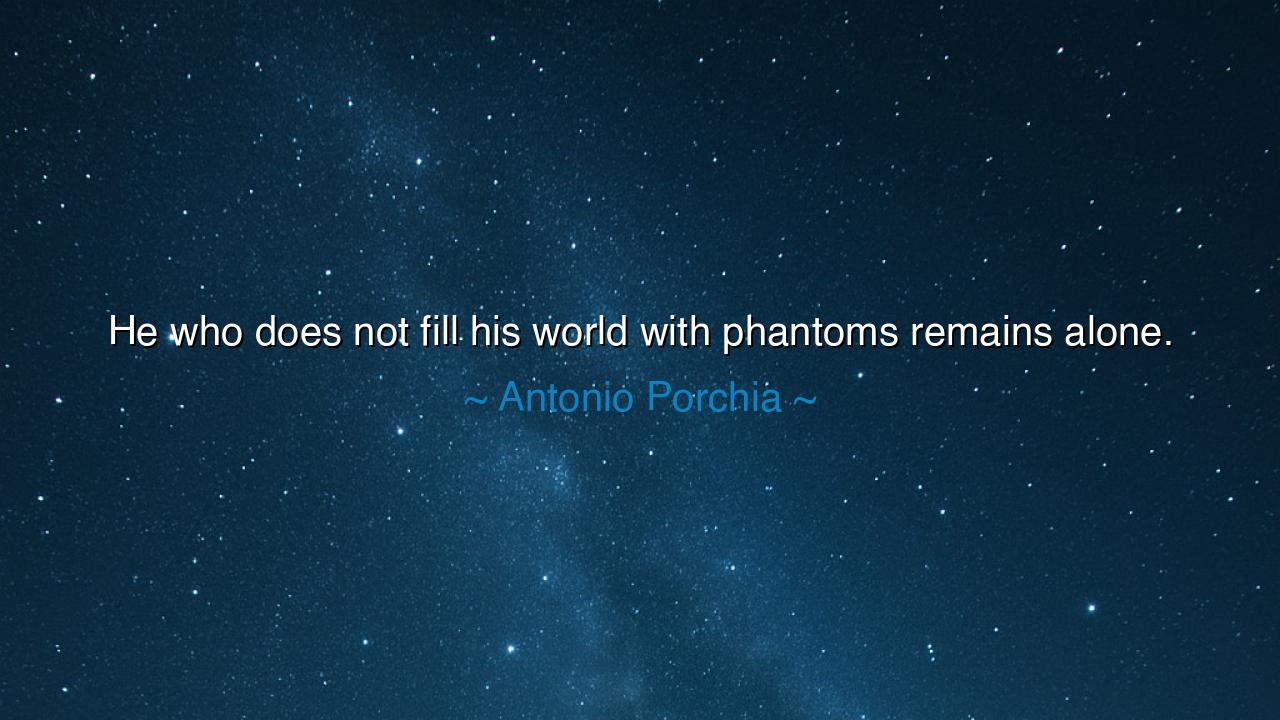
He who does not fill his world with phantoms remains alone.






In the haunting and poetic words of Antonio Porchia, he writes: “He who does not fill his world with phantoms remains alone.” These words, taken from his collection Voces — brief fragments of mystical reflection written in the early twentieth century — carry the resonance of both sorrow and insight. Porchia, an Argentinian philosopher of the heart and soul, speaks here not of ghosts as superstition, but of phantoms as the living symbols of memory, imagination, and the unseen presences that give meaning to human life. His sentence is not a warning against illusion, but a lament for emptiness — a recognition that the one who refuses to dream, to remember, or to love beyond the visible world, becomes utterly alone.
When Porchia speaks of “phantoms,” he refers to the invisible forces that populate the inner world of every human being — the faces of those we have loved and lost, the dreams that never came to pass, the ideals that haunt our conscience. These are not figments of madness, but shadows of meaning, the echoes of spirit that make life bearable. To “fill one’s world with phantoms” is to live in relationship with what is beyond flesh and fact — to carry within oneself the presences that keep the heart awake. The man who refuses these phantoms — who lives only by logic, matter, and surface — may be surrounded by others, yet his soul is a desert. For he has banished the unseen, and with it, he has exiled himself from wonder.
The origin of this thought lies in Porchia’s own life. Born in Italy and raised in Argentina, he lived simply, losing his father at a young age and enduring hardship with quiet dignity. His writings, like this quote, reflect a man who had loved and grieved deeply, yet found wisdom in solitude. The phantoms that filled his world were likely his memories, his questions, and his longing for meaning beyond what the eye can see. He understood that to be human is to live with the company of what is absent — to be shaped by the things we cannot hold. His words remind us that emptiness is not conquered by denial, but by the courage to make peace with the ghosts that live within us.
Consider the story of Michelangelo, who once said that every block of marble contained a statue waiting to be released. He worked as though the spirits of his creations already existed inside the stone, and his hands merely set them free. Those phantoms — the imagined forms within the raw rock — filled his world and guided his genius. Had he seen only lifeless marble, he would have remained an ordinary sculptor; it was his communion with the invisible, the imagined, that made him divine. In the same way, every soul must see beyond the surface of life — must believe in what cannot yet be seen, must allow the unseen to whisper its guidance — or else the world becomes a cage of emptiness.
Porchia’s words also speak to the realm of love. Every affection, every bond, is in part a relationship with a phantom — for even those we love most deeply are never fully known. We see them through memory, through hope, through the shifting light of our own hearts. When they depart, we carry them as phantoms of presence — living still within our thought, shaping our choices, our sorrows, our joys. The one who refuses to keep such phantoms — who forgets easily, who loves lightly — is spared pain but condemned to isolation. For love itself, when it endures beyond the visible, becomes the noblest phantom of all.
Thus, Porchia’s saying is not a call to illusion, but a hymn to imagination and remembrance. To fill one’s world with phantoms is to live richly — to walk in communion with memory, with longing, with the unseen depths of being. It is to recognize that even absence has presence, that loss can still speak, that ideas and dreams are as real as stone and water. The soul that honors these invisible companions is never truly alone; for in its quiet chambers dwell the spirits of everything it has loved, everything it has believed in, everything it still hopes to become.
So let this be the teaching: do not fear your phantoms. Let your world be filled with the voices of those you have lost, with the dreams that still call your name, with the ideals that demand your faith. Speak to them, learn from them, let them shape your days. For the one who dares to walk with ghosts learns what it means to live with spirit. The emptiest heart is not the one haunted by memory, but the one that has silenced it.
Therefore, remember Antonio Porchia’s wisdom: the soul that rejects its invisible companions becomes barren, but the soul that embraces its phantoms lives in eternal company. Fill your world with meaning, with memory, with imagination — and you will never walk alone.






AAdministratorAdministrator
Welcome, honored guests. Please leave a comment, we will respond soon